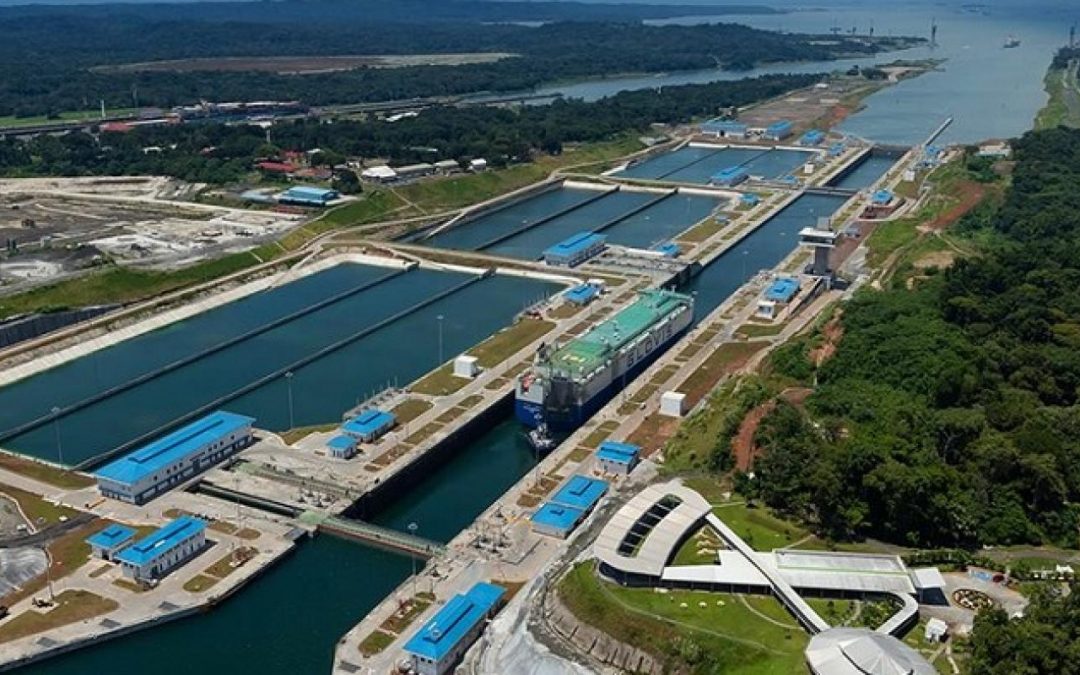Major shipping lines are scrambling and looking for ways to deal with the growing backlogs at the Panama Canal. The prospects of a growing wait reportedly prompted one company to bid a record $4 million for one of the open slots bringing their anticipated total transit costs to $4.5 million and still they have to wait another week to get their empty gas carrier on its way.
The worsening drought in Panama has drawn international attention as the Panama Canal Authority continues to reduce capacity in order to manage its dwindling water supply. After warning that it was scheduled to cut slots to 30 daily transits between the two locking systems as of November 1, the Panama Canal Authority surprised the industry on October 30 saying more drastic cuts were required. They immediately went to 25 daily slots and with a phased series of cuts, they will reach 18 slots on February 1, 2024.
The canal’s reporting system shows as of the end of the day today, November 9, the backlog has grown to a total of 109 ships, including 63 without reservations. The average wait for non-booked vessels has been going up steadily in November and currently stands at a five-day average for the past 28 days on the northbound transit to the Atlantic, and six days for the southbound transit. Panamax Plus vessels have the highest average wait reaching 11 days while one Neo Panamax vessel is reported waiting 13 days for a northbound transit.
Owners are taking different approaches with some appearing content to wait Bloomberg first reported that a new record price was paid at the daily auction for slots used by vessels without a reservation and they calculated that another vessel simply turned around and took a different course.
The Panama Canal Authority confirmed the reports of a record $4 million price paid for the slot in yesterday’s auction, November 8, and even still the first slot the vessel could secure was November 15. As per Bloomberg’s report, Japan’s Eneos Group is paying the record (officially $3.98 million) for their vessel the Sunny Bright, a 50,000 DWT LPG carrier that according to its AIS signal arrived at the Pacific anchorage on November 4. The day before the auction, Bloomberg reported that the Sunny Bright might be giving up and departing to follow an alternate route to the terminal in Houston, Texas.
While the one gas carrier paid for the privilege of a reservation, Bloomberg reports a second one without a reservation apparently gave up. The Pyxis Pioneer, a 54,000 DWT LPG carrier, they speculated was leaving after having also arrived at the Pacific anchorage on November 4. They proposed the vessel would round South America to get to Houston to load its next cargo.
The new record at the auction came just eight days after an earlier report of a record at the auction. Prices typically increase in the fall as more gas carriers are making the transit with a record of $2.6 million in November 2022. Typical auction prices were around or below $1 million although owners were paying well over $2 million this year. The October 30 auction saw the prices rise to a reported $2.85 million for a reservation.
Analysts have speculated that as the number of daily transits is lowered it is likely that more classes of ships will be either squeezed out or chose alternate routes. Already one cruise line, Royal Caribbean International canceled a program of 2024 trips that were to have been making the transit, while the larger containerships have been forced to transship portions of their cargo across the Isthmus by train to reduce their draft.
The Panama Canal Authority reports it is taking steps such as the use of water reutilization basins for the Neo Panamax locks and cross-filling at the Panamax locks to conserve water. They elected to lower the number of daily transits while holding the draft restriction to a maximum of 44 feet at the Neo Panamax locks and 39 feet at the Panamax locks. The authority has warned the restrictions are likely to persist through 2024 noting that short-term weather forecasts show no improvement after October was the driest month in over 73 years of records.
Source: The Maritime Executive





